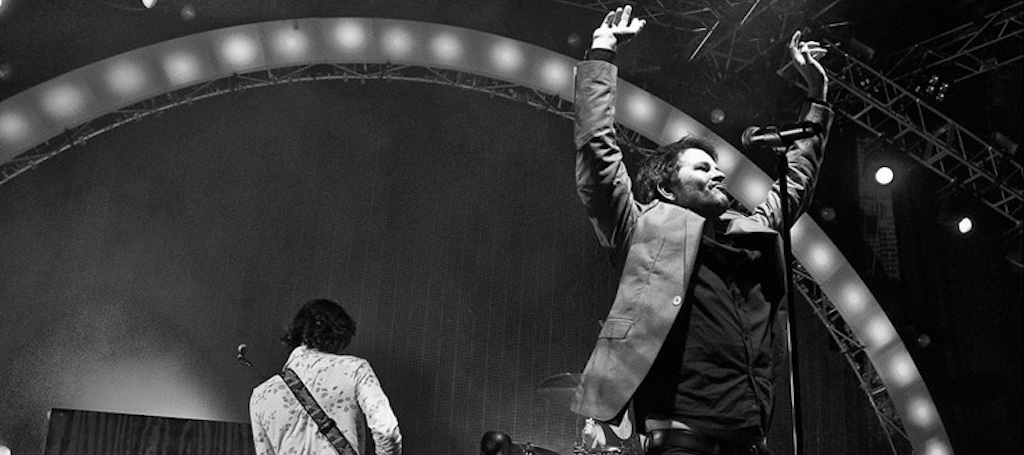
Some may remember the heady days of the early ’90s, when they’d play bikie bars for a seedy rider. Others discovered Powderfinger in the sweaty moshpit at the Big Day Out. Or you may have only found them in their twilight days, farewelling the band alongside thousands of fellow fans on their Sunsets tour.
Whichever way you discovered them, Powderfinger burned their name across the Australian music landscape, clocking up 5 number 1 albums, 18 ARIA awards, 3 APRA awards and sales of more than 2.5 million albums. But that’s not what set them apart.
The ambitious, honest, hard-working Brisbane band consisted of Ian ‘Hoggy’ Haug (guitar), John ‘JC’ Collins (bass), Bernard ‘Bernie’ Fanning (vocals), Darren ‘Darius’ Middleton (guitar) and Jonathon ‘Cogsy’ Coghill (drums). They were successful, yet humble. Their no-bullshit, down-to-earth attitude, paired with their politically conscious lyrics made them accessible to people from all walks of life. That, and some fucking catchy tunes.
Where were you when you first heard, saw, felt and fell in love with Powderfinger? Were you old school and rocked hard to Parables for Wooden Ears’ mathematical riffs? Was it Double Allergic’s simplified songs that caught you? Was it the hits on Internationalist? Was it the album that cemented their status in Australian music, Odyssey Number Five? Or the album to redefine rock, Vulture Street? It could have been the album that nearly broke them, Dream Days at the Hotel Existence? Or was it their swansong, Golden Rule that got you hooked?
If I Tried
The first-ever Powderfinger gig was at a house party in 1989, performing to about 10-15 people.
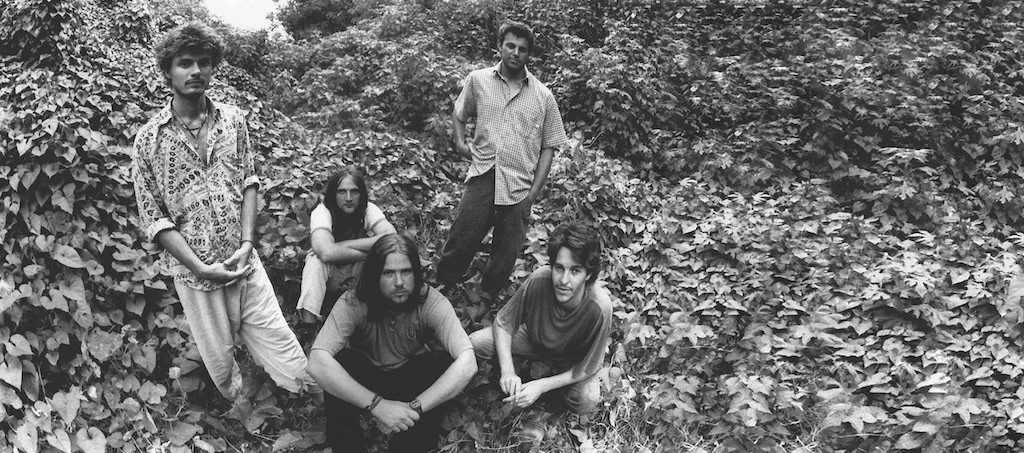
The original three-piece consisted of high school mates—Hoggy, JC, and his best mate, Steven ‘Bish’ Bishop. They played covers of Neil Young, R.E.M., and Sunnyboys on a home-made PA.
The band was the brainchild of young Hoggy who already had a guitar practically welded to his fingertips, and dreams of rock-stardom, playing illegally in pubs and clubs across Brisbane. Once he connected with fellow Grammar classmate, JC, in Year 11, that dream started to become a reality, and the genesis of Powderfinger had begun.
After quite a few more house parties, they recruited Darren on guitar and Bernard on vocals. And the departure of Bish created an opportunity for Cogsy to join the band. The Powderfinger line-up was solidified. It would remain that way for the next 20 years.
In 1992, the band spent a few days at Broken Toys studio in Brisbane recording a handful of songs for their debut EP. Known as The Blue EP, or ‘Bluey’, the 7-track CD was a massive DIY project. JC designed the cover, and the band held working bees to assemble the CDs. They sent out invites, put up posters, and threw a launch party at the Orient Hotel on 21 August 1992.
The band had sold more than 600 tickets to a 400 capacity venue. People were crammed in, spilling over the sidewalk, and some watched through windows on the streets. They played for their lives.
Around that time, someone broke in and stole the majority of those EPs. Today, with only a limited run, the eBay value of the rarity is around $500 a pop. We hope those burglars held on to some for their retirement. Are you one of the lucky few to have a copy of this sought-after EP?
Reap What You Sow
In 1993, after touring heavily, Powderfinger garnered fans in the public and music industry alike, and began to sow the seeds of their success.
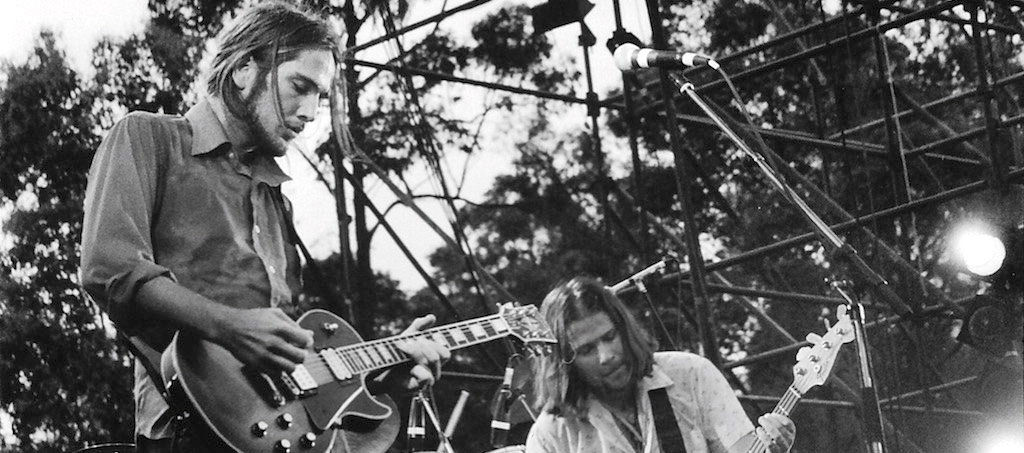
Brisbane provided a laconic backdrop for the boys. They were on the dole, dropping their forms off at Centrelink each week and making up jobs by stabbing a pen into the Yellow Pages™.
Their rehearsal room in the Target building in Fortitude Valley [fact check] was home to other contemporaries at the time: Dreamkillers, Pangaea, Brasilia, Custard and Screamfeeder. They were regulars at the Royal Exchange. Like, really regular. Maybe you shared a beer with them? The Brisbane music scene revolved around the Metropolis’ Rock Against Work free daytime shows, Powderfinger included. Can you remember those carefree times?
They left their home state, Queensland, for the first time. Their debut Sydney show was at the Forest Lodge Hotel in Glebe. They played to seven people—one of which was future chart-topper, Alex Lloyd. Then another show at classic pub-rock venue Springfields, Kings Cross, alongside Choirboys and their ilk. They still had a few leather pants of their own. Did you catch a glimpse back then?
In amongst it all, Powderfinger recorded their second EP, Transfusion. Recorded by mate Jeff Lovejoy, the heavier-sounding tracks included their first real single, Reap What You Sow—a five-and-a-half minute song that captured their skill and potential.
The music industry began to take notice. Major labels started a-courting. It was the laid-back approach of Tim Prescott of Polydor that won their trust—and ultimately their signatures on a five-album deal. It was a Friday night at Metropolis in July 1993 when Tim saw 1000 people rocking out to Powderfinger and knew they were destined for big things. He cracked some XXXX in the kitchen at an afterparty and history was made. Were you at the show that sealed the deal?
And the seeds began to grow.
Hurried Bloom
Powderfinger hit the studio to record their first long-player.
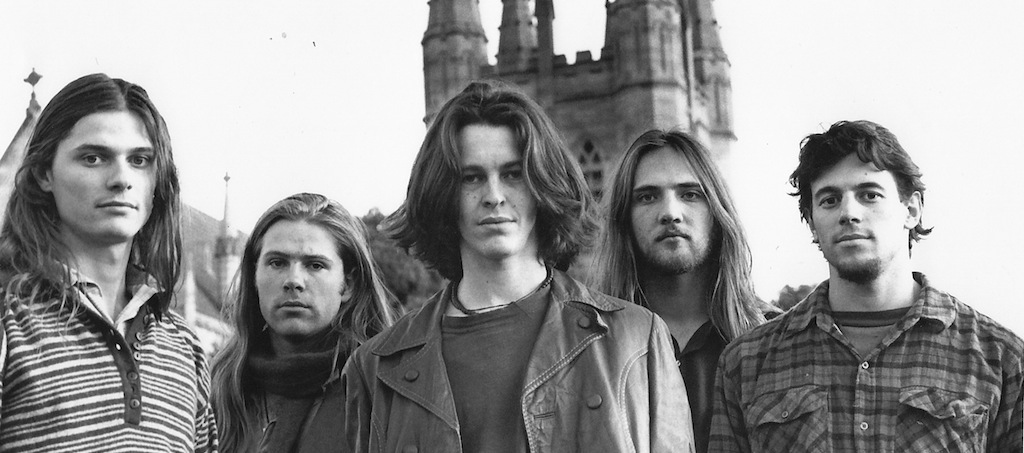
Armed with a major budget and the pressure to perform, the result, Parables for Wooden Ears, was a hurried bloom—suffering from rehearsal room influences to sound heavier and more like their contemporaries. It marked a massive change in direction for the band—a more aggressive, mathematical approach to playing and recording. The reviews were mixed.
Still, the band continued to leave their footprint on the music scene, their dynamic live shows making up for the cluttered recording. They played their first Big Day Out in 1994 at 11am on a side-stage that was basically the back of a truck. Were you one of the faithful in the audience that day?
Powderfinger shared the bill of Livid with Beastie Boys and Frank Black. Triple J offered them a Live At The Wireless slot. They continued to clock up live shows, touring in their decrepit van, ‘The Econodog’, across the country. They probably should have turned down the opening slot for Pantera—bullies to both them and their crowd. However, it did cement one thing in their minds: they didn’t want to be playing heavy music in that heavy scene.
Despite touring constantly, their growth was starting to plateau. There were only so many times they could play to the same Brisbane crowd. The band were starting to hate playing the songs from Parables live, trying to find a groove that didn’t exist in the over-developed tracks.
Luckily, they still had plenty of room to grow.
Pick You Up
After some reservations from their label after the disappointing sales of their debut, the band were having their own doubts due to a grueling tour schedule.
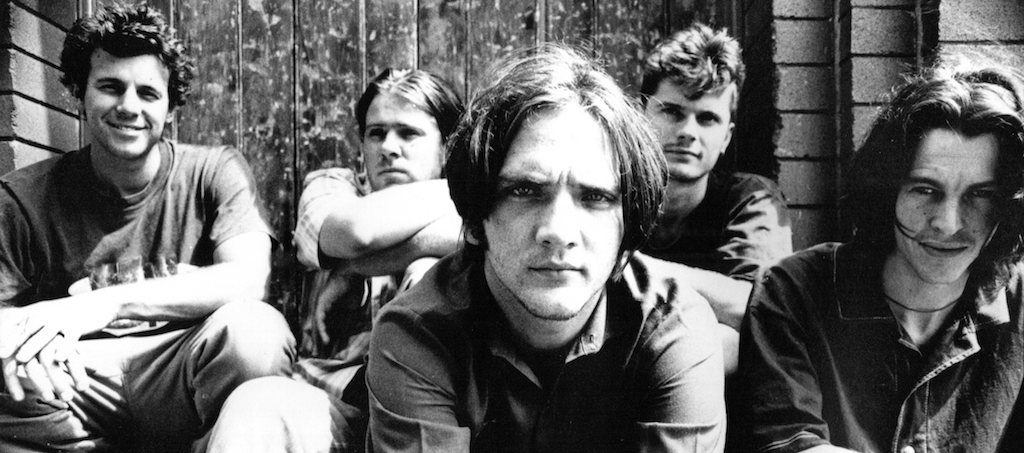
Yet Powderfinger were to have a shot at redemption. They decided to pare back their sound and simplify their structure and timing—and by the time Powderfinger hit the road at the end of 1995 for a 10-week tour in support of their Mr Kneebone EP they had written a dozen new songs.
One of these tracks was Pick You Up, a song that tumbled out of Bernard while missing his girlfriend on the road. It was a turning point for the band. They played it live for the first time on a winter night at the Lismore RSL (after finishing it during their now regular sound-check writing time) and it had an immediate effect on the crowd. Were you one of the lucky few to hear this track for the first time?
‘Pick You Up definitely had the biggest influence on our direction,’ says Bernard. ‘…One of the strengths we had was simplicity. When we did something simply, it was really powerful. It was emotional power that actually carried it—it had nothing to do with distortion. It was more about dynamics. That’s how we got ourselves to work.’
And work it did. After playing Homebake—the annual festival all about Australian music—Powderfinger stepped into the studio to record Double Allergic. Pick You Up was released ahead of the album, and it quickly found a home on both Triple J and commercial radio. Were you a worshipper of Helen Razor and Mikey Robbins’ cult show on Triple J when Razor declared the song her tune of ’96?
The momentum continued with their live shows growing exponentially. Where they had made a dint in the interstate live scene of Sydney in Melbourne, they were now selling out three Corner Hotels in a row, and packing the Metro to the rafters.
Did you tune in religiously to the ABC’s Recovery program, and see Powderfinger making their television debut to perform Pick You Up? They also performed latest single D.A.F, which jumped onto radios across the country almost as fast as its predecessor.
When the album finally dropped, the reviews were glowing, and the album stayed in the top ten for ten weeks. During this time, Powderfinger hit the road with their rock ‘n’ roll idols, You Am I, and the two bands became firm friends over a love of ‘bad gin’. Tim Rogers recalls the impact that Pick You Up had on the audience. ‘About a third of the way into the tour, we thought ‘Oh shit—the takeover begins!’…You could see something going on.’ Did you feel the momentum as Powderfinger toured hard with You Am I?
The release of Double Allergic also saw Powderfinger playing the biggest show of their career to date. On 24 November 1996, Powderfinger helped Crowded House farewell the world on the steps of the Sydney Opera House. The Brissie boys were first-on supports, flying in on a chartered plane to do the slot. It was their first taste of the big time, playing to more than 100,000 people.
The day was full of highs and lows—literally. After playing their set, Powderfinger jetted back to Byron Bay to resume their headline tour, only to fly straight into an electrical storm. The pilot attempted 2 dive-bomb landings before setting the aircraft down safely. Luckily the beers had been flowing freely, and the band recited air-crash melodies to pass the time.
Powderfinger had been lifted to the forefront of Australia’s alternative music scene.
The Day You Come
With Double Allergic selling more than 120,000 copies, Powderfinger were jumping planes left, right and centre, playing the Big Day Out across all six dates, including the NZ leg.
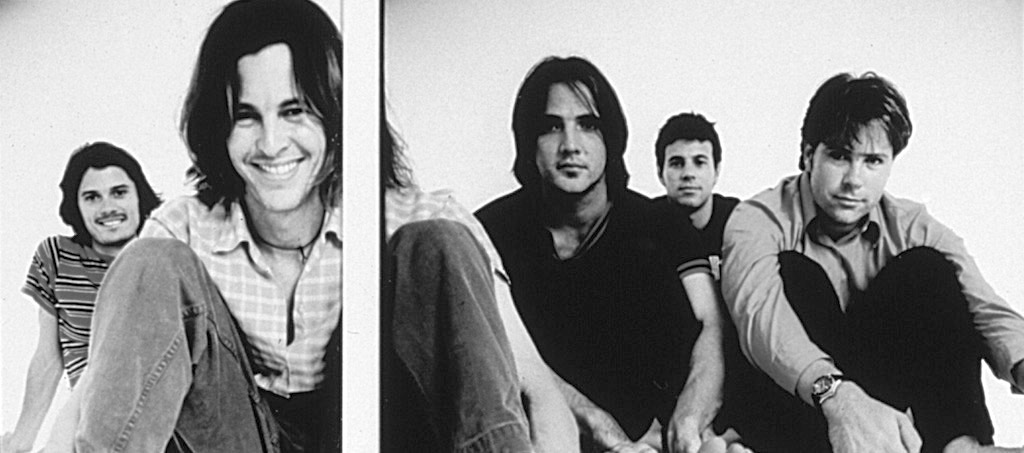
For a band that was previously relegated to 24 hours in ‘The Econodog’, with two members flying on rotation, this was luxury. It also marked the graduation of the band to professional musicians, with royalties allowing them to pay themselves minimum wage.
In the downtime before recording their next album, Powderfinger took a break from the open road, and each other. It translated into a prolific writing period. The first track the band wrote together was The Day You Come, which saw the band experimenting with a new sound that would set the tone for their next record. It was an arrival, in more ways than one.
The toll of touring permeated the song lyrics of opening track, Hindley St. But touring was what Powderfinger did best, and it wasn’t about to slow down—it was about to take off.
Before the release of Internationalist, Powderfinger would make their first foray into the American market. The opening show at the Dragonfly in LA was attended by Russell Crowe (in town to film LA Confidential). Were you in the crowd that night, our American friends? Did you see Powderfinger turn down Rusty’s invite to come back to his place for a party? #regrets
On their return to Australia, Powderfinger set off on their biggest tour yet, joined by Big Heavy Stuff and Jebediah. The venues grew, and they turned their soundchecks into much-needed writing time. Much of Internationalist was formed in these sessions on the road. Some even made it into the setlist. Did you see Capoicity in its infancy, performed at the Metro back then?
After losing almost every category at the ARIAs to Savage Garden, Powderfinger hit the Livid stage—not for the first or last time—before scheduling in a secret gig at the Crash and Burn under the pseudonym of Terry and the Econodogs to test a few of the new tracks in front of a live audience. Were you there to hear Good Day Ray, Celebrity Head and, of course, The Day You Come played for the first time?
Armed with the bulk of an album, Powderfinger began a relationship with US producer Nick DiDia in early 1998—a friendship that would last the rest of their career. It was a big step up, and they found a producer who knew how to get the best out of them all.
When The Day You Come was released in August that year, the critics called it ‘one of the best Australian rock songs of the decade’ (Ian Shedden, The Australian). The furore around Pauline Hanson’s racist rhetoric fuelled the fire, as the public picked up the track, using it as an anthem against hate.
When Internationalist dropped six weeks later, it heralded the arrival of Powderfinger into the collective consciousness.
Internationalist debuted at the top of the ARIA charts, and hit Gold status (35,000) in one week. The gigs grew exponentially. They returned to the Sydney Opera House, this time to play a Triple J broadcast celebration for the iconic building’s 25th anniversary. Did you tune in to Live At The Wireless and hear Powderfinger play the new album in full just before their biggest tour yet? The venues grew too, housing more than 4000 sweaty punters in their hometown’s Festival Hall.
It was at this time that Powderfinger were also approached by Australian filmmaker Gregor Jordan to write a track for his upcoming film, Two Hands, starring Bryan Brown and a young upstart called Heath Ledger. These Days was born.
The day had well and truly come for Powderfinger.
My Kind of Scene
Powderfinger announced the ambitious P2K tour with Something for Kate, stepping up venue size once again.
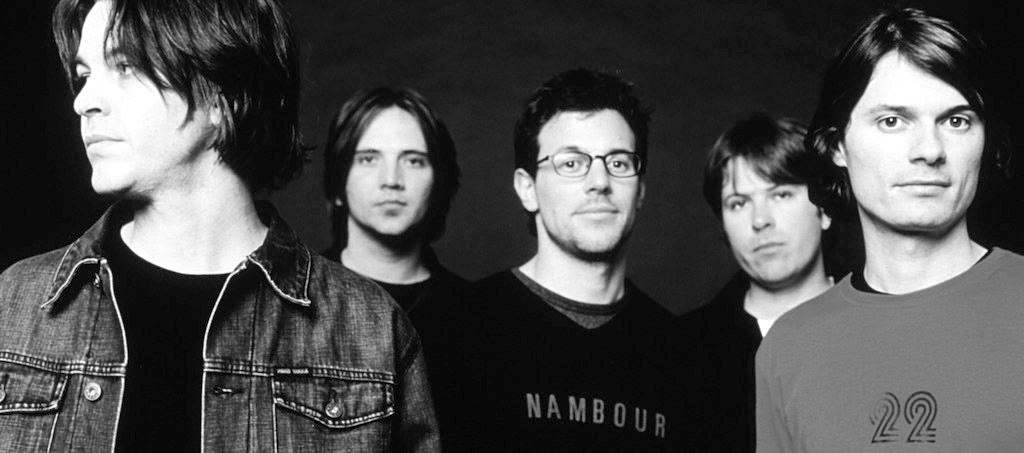
Despite the resounding success of Internationalist, ticket sales began to plateau. That was until These Days was suddenly heard everywhere (alongside the hit movie it was written for), and both Heath Ledger and Powderfinger became household names. Passenger also boomed over the airwaves and the single release sealed the deal. These Days was the B-side. Needless to say, the tour was a resounding success. Did you see them in these halcyon days?
This time Powderfinger cleaned up at the ARIA awards, picking up Best Rock Album, Record of the Year and Album of the Year. They performed Passenger live with a brass band and backing vocals—a feat only a lucky few got to witness, while the rest of us watched on TV. But the time had come to start thinking about their next release, and the pressure was already beginning to mount.
The band broke the strain by playing a few gigs—Homebake, Rock-it, and Gone South (in Launceston). The Tassie show was a highlight for JC and Hoggy, as they shared the bill with idols, The Church. You’ll hear more about that from Ian later.
Then, on Australia Day 2000, Triple J’s Hottest 100 poll flashed up the name of the number 1 song of 1999 on enormous screens at the Big Day Out as the heaving crowd moshed below. The final track was then beamed into backyard BBQs across the country. It was These Days. What were you doing on that day, when the opening lines ‘It’s coming ’round again/Slowly creeping hand/Of time and its command’ crooned on your stereo?
Meanwhile, the backbone of Odyssey Number Five was starting to form in the rehearsal room—although not without its problems. This time, My Happiness was to be the defining skeleton that the rest the album would hang its skin off. Again, they hit the studio with Nick DiDia to carve out the rest of the record.
My Kind of Scene, in particular, took some getting right. But the growing pains were worth it. Hollywood superstar, Tom Cruise had become a Powderfinger convert, and wanted a track for Mission: Impossible II. He would end up choosing My Kind of Scene to sit alongside US heavyweights Metallica, Foo Fighters and Limp Bizkit on the soundtrack.
When My Happiness finally dropped ahead of the album, it was the biggest hit of Powderfinger’s career. It became an anthem for a generation. Odyssey Number Five charted at number 1, and stayed there for three weeks.
Powderfinger had managed to pull off mission impossible—defining a scene that had become their own.
Rockin’ Rocks
Success didn’t come without its hardships. The massive touring schedule continued with highs and lows throughout.
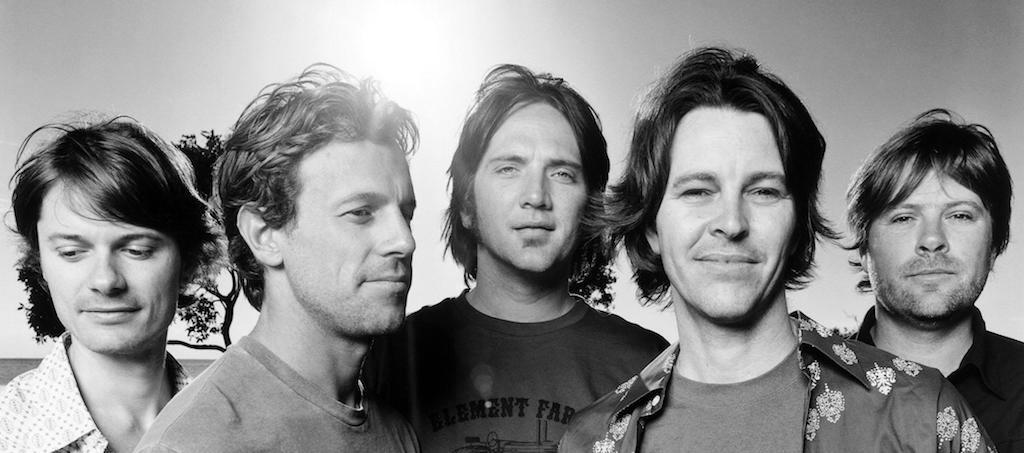
The Big Day Out left a bittersweet taste in Powderfinger’s mouths. They topped Triple J’s Hottest 100 once again with My Happiness, but the backstage vibe was hijacked by the aggression of the US headliners, Limp Bizkit. That aggression manifested in tragedy when teenager Jessica Michalik died in the moshpit in Sydney.
Limp Bizkit quit the tour and returned to the states. Powderfinger proved themselves to be statesmen of rock, stepping up to lead a tribute to Jessica at the Adelaide show a few days later. They held a minute’s silence before playing a somber These Days. Did you hang your head that day?
Backstage at the Big Day Out was also where Powderfinger met Coldplay. They would go on to play many shows with the upcoming UK act, including a US tour to thousands of punters and industry stalwarts. They were starting to make a mark in the biggest country in the world.
Despite their big breaks, it wasn’t to be in the US for Powderfinger. September 11 changed all that, and the momentum the band had slowly been building with appearances on Up Late with David Letterman, and massive shows with the right bands just stopped. They returned home, exhausted, to pick up the pieces of their fractured home lives.
Powderfinger headlined the inaugural boutique winter festival, Splendour in the Grass, in Byron Bay. It was a huge success and the perfect antidote to the Big Day Out. And a few shows in Japan for Fuji Rock proved an inspiration for the band as they got to see their hero, Neil Young, perform their namesake song live from the side of stage.
After a three-month break, Powderfinger reconvened at a house on Stradbroke Island to sink beers and reconnect. They knew the direction they wanted to go in for the next record. They all agreed on a rockin’ rocks sound, and started to analyse the eternal question: ‘What is rock?’.
This time it was JC’s initial riff for (Baby I Got You) On My Mind that would be the crux of the album. Darren transformed that initial riff and the new definition of rock was finally taking shape.
Back in the studio with Nick DiDia, the six weeks in a Sydney studio were comfortable and fun. Bernard honed his vocals to reference ‘70s Bowie records, and together they forged a new generation of rock anthems.
When it was released, Vulture Street (named after the one-way heart-line road that runs through Brisbane) hit number 1, stayed there for three weeks and spent five months in the top 10. The nation had proved once again that it loved their way.
Drifting Further Away
Despite inking another record deal with what had now become Universal Music, it would take nearly four years before Powderfinger would release another album.
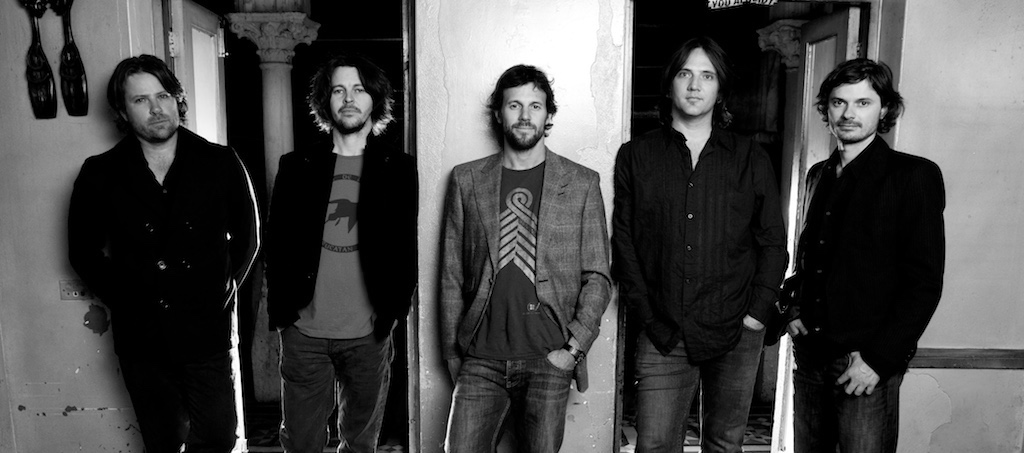
The personal lives of the five family men now took centre-stage, as well as the opportunity for each member to work on side and solo projects.
Were you at the Healer in Brisbane when they put on a secret show under the moniker Donkey Boys in July 2003? It was a warm-up for their return to the main stage at Splendour, before embarking on the Live on Vulture Street arena tour. Some fans may remember the band’s first show at Brisbane’s iconic Riverstage (that would later become the scene of their last public show) where Lord Mayor Tim Quinn handed them the keys to the city. That key took pride of place on the wall of the toilet of their management office. It still does.
They came off the back of 10,000 cap shows in Australia to play clubs in Europe, but also played their unanimous ‘best show ever’ to 5000 loyal Australian expats and new British fans at the Hammersmith Apollo. Did you see it? Were you there?
They also cemented their status as rock royalty by playing for a real princess-to-be in Copenhagen, as an Australian commoner became Princess Mary of Denmark.
After returning to Australia, and another stint on Triple J’s Live At The Wireless to celebrate the release of Fingerprints: The Best of Powderfinger 1994-2000, they hit the Big Day Out again. But it was the tsunami benefit concert Wave-Aid that would really leave an impact on the 50,000 fans at the SCG that January. Performing alongside Silverchair, Midnight Oil and Missy Higgins. It was an historic event.
After the Big Day Out wrapped, Powderfinger went their separate ways. It would be another two years before they would meet up again.
When they did return to write their sixth studio album, the band wanted to shake it up a bit. They eschewed their trusty producer, Nick DiDia, and headed to LA to record with US heavyweight, Rob Schnapf.
The resulting album, Dream Days at the Hotel Existence, divided both the band and critics alike. The lead single Lost and Running, was indicative of where Powderfinger were at—still going, but not sure where to. Nevertheless, it hit the charts at number 1, and produced some fan-favourite tracks.
Burn Your Name
Dream Days At The Hotel Existence saw them team up with Silverchair to pull off the biggest shows executed by an Australian act in recent history.
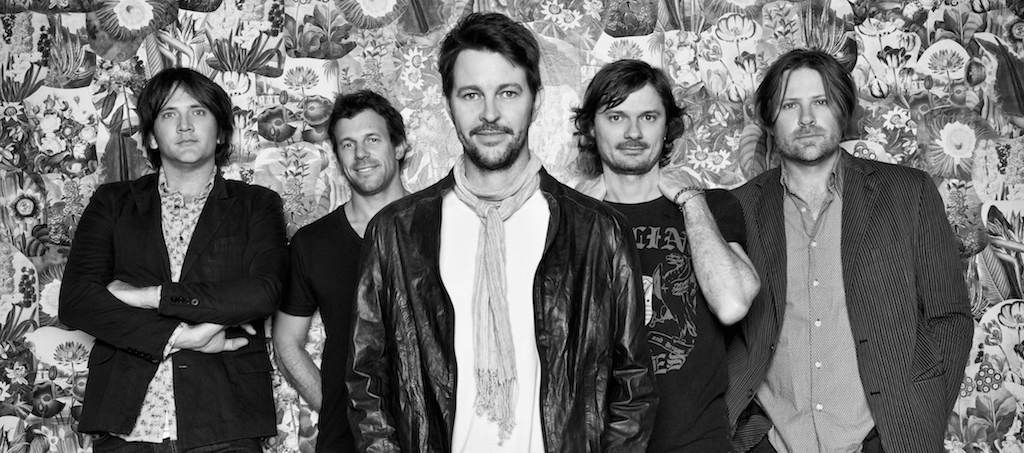
Across the Great Divide saw 33 shows over 8 weeks, raising awareness for Indigenous life expectancy through Reconciliation Australia.
It was the most fun the boys had had on the road in years. And having the Silverchair guys in the mix made it one long party. Powderfinger left the tour the happiest they’d been as a group in years.
They devised a series of shows specifically for fans—returning to theatres to play the set in two halves: acoustic and then a rock show. The intimate Upstairs at the Downstairs sold out to fan club members, and asked them to contribute to the set list. Did your favourite track make the list?
They ticked one more big thing off their list before returning to the writing room—performing live at the AFL Grand Final to 100,000 fans at the MCG, and another 3.4million at home. Sports fans, do you remember watching as Powderfinger spliced On My Mind with AC/DC’s Long Way to the Top?
The studio sessions for what would become Golden Rule were designed to be as stress-free as possible. They chose the laidback holiday town of Byron Bay, and brought their families down to stay for the six-week period. They even implemented Gentlemanly Friday, where the group would dress up in dapper suits for studio cricket. Did you catch a glimpse of the gents as they wandered around town?
Golden Rule hit the charts at number 1, making it five albums in a row for the Brisbane boys. However, the decision had been made that the album would be their last. Powderfinger wanted to go out with a bang, not a whimper. Their departure was heralded with a press conference announcing their biggest and most ambitious tour yet—and the end of Powderfinger.
After more than twenty years as a professional band, seven studio albums, three EPs and countless tours across the nation, Powderfinger had burned their name into the nation’s history.
These Days
Powderfinger split in November 2010. After the massive Sunsets arena tour where they said goodbye to more than 300,000 fans, the band chose their hometown of Brisbane to play their last ever show.
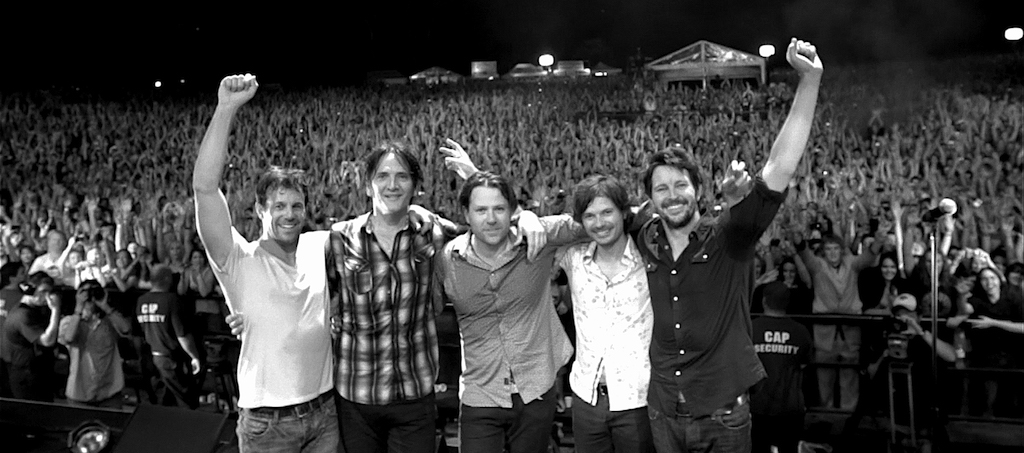
At the sweeping amphitheatre of Riverstage, Powderfinger took their last public bow in front of thousands of adoring fans. Some had been there from the beginning; some were new converts; some were, well, you.
However, that wasn’t to be their final show together. They had one last goodbye to make—the fondest farewell of all to their friends, family and the music industry colleagues who had helped them along the way.
It was jubilant, intimate and messy, performing to 900 invited guests at the Tivoli Theatre. After the showmanship of the arena tour, it was a fitting goodbye for a bunch of humble Brisbane boys made good.
These days Bernie, Hoggy, JC, Cogsy and Darius are doing their own thing. Powderfinger may be Already Gone, but their music endures.






